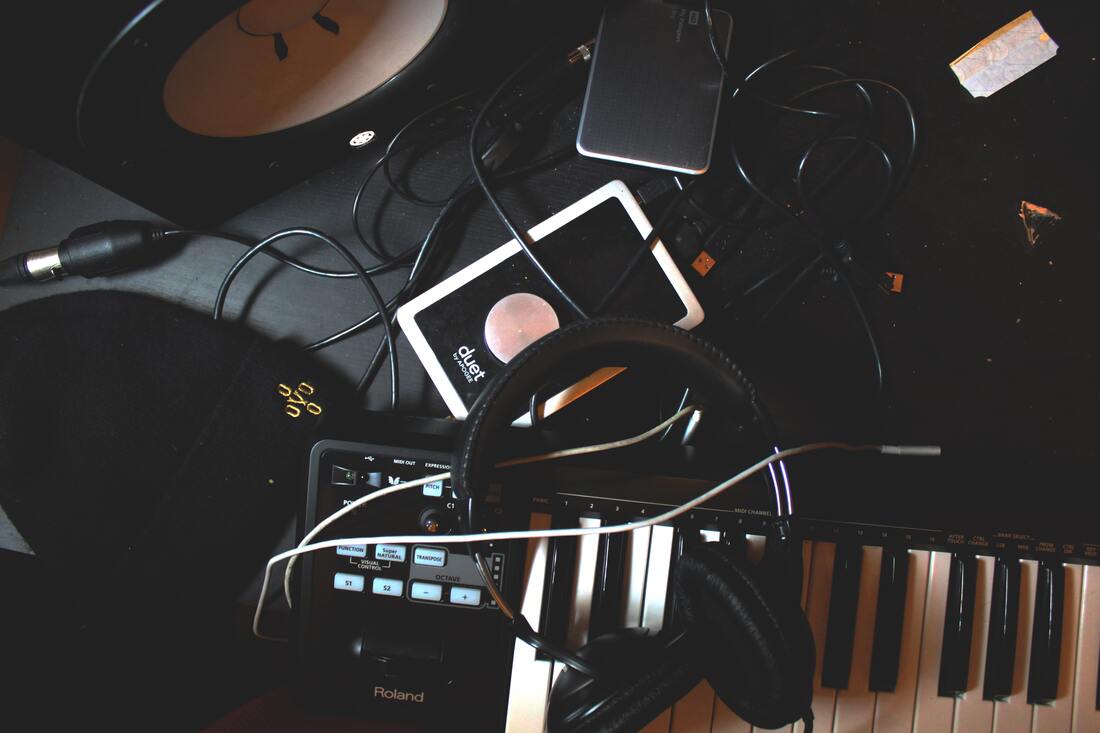|
The environment for making music has shifted. If you were a musician back then and you wanted to create an album... Every night, you and your band gave it your all in bars and clubs... And hoped that a powerful producer would see you and be impressed enough to offer you a chance. Today, home studios are becoming more and more popular for music creation and creative people. Everyday people create excellent music in their homes' basements, garages, and bedrooms. frequently using only a computer, a USB microphone, and some headphones. You can become famous overnight by recording a song, posting it online, and watching it go viral. It is SIMPLE, even though it is not that EASY. Recording
We now employ a sophisticated technique called multitrack recording. where each instrument is recorded individually and then mixed together later. This has two MAJOR benefits:
With the use of this innovative technique, one guy was able to do tasks that previously required a large group of engineers and musicians to complete. Making a roadmap or other form of instruction manual for the other instruments to follow is the first step. To set a tempo, most people utilize a straightforward click/metronome. But since not all artists are adept at following clicks, you may also employ a drum loop that has already been recorded. Another option is to make a scratch track because not all songs have consistent tempos. When a single instrument or a collection of instruments are "over-dubbed" until the original may be "scratched," or erased, one at a time. It's time to clean up your recordings once you've completed recording them. Because regardless of how cautious you were in the previous step. There are ALWAYS CERTAIN errors that can and ought to be corrected. Typically, editing consists of these 5 regular tasks:
With arranging, you examine what you've accomplished thus far in its whole to determine what is effective and what is not. By comparing the duplicate takes of each track, you can choose the best one. You may even choose the greatest lines from each attempt and combine them into a single "Frankenstein-take" if you'd like. When using noise reduction, all sounds are removed from the audio before, after, and in-between each part when an instrument is performing. You can correct off-beat notes using time editing in one of two ways: On percussion instruments, the "cut and paste" technique is effective. The "time-stretching" technique can be used with nearly any instrument and is effective. Tune editing allows you to use Auto-Tune or other similar software to adjust any off-pitch note back to its correct pitch. It is typically applied to vocals, although it also sounds good on the majority of melodic instruments. Publishing How to publish your music on your own. If you wish to publish music yourself, it is crucial to comprehend the notion. Finding the best ways to self-publish your music might be challenging, but we have some advice to help. It's crucial to first comprehend what music publishing actually is. The administration of copyrighted music that is utilized commercially is known as music publishing. A publisher is in charge of identifying licensing opportunities, collecting royalties, and allowing the public to listen to music created by the artists they represent. Self-publishing is the practice by which certain artists handle their own publications. Are You Ready? Ask yourself if you are unquestionably ready if you feel you are past the point of uploading demos to Bandcamp or Soundcloud. Is the quality of your music good enough to compete with popular music, or at least with professional musicians in your genre? Self-publishing assistance services (like Tunecore) demand a minimal financial commitment from you. Be certain that you are prepared to commit to this. Having The Assets It should go without saying, but do you actually have songs to publish? Record a demo CD of your tracks first. Make sure you are using top gear to make it top quality like from singularsound.com. You'll nearly always need something to distribute, especially after shows or any other events you might be playing at. Produce content of a high calibre. It may seem apparent, but you are responsible for the quality of your songs if they aren't produced well enough. You can begin self-publishing once you've put together a few high-quality recordings. How To Do It? You must register your music with a "Performing Rights Organisation" in order to lawfully self-publish it (PRO). You must do this if you want to profit financially from your single, EP, or album. Additionally, you must do this if you intend to get all of the proceeds from the sale of your song in public (such as a gig or radio play). You may either publish your own music and sign up with a PRO, or you can find a respected music publisher ready to take you on as a customer. You might be able to register your music with a PRO and receive royalties without dealing with a major publisher, so it's definitely a possibility. Information about how to upload music to iTunes and Spotify In 2019, downloading and streaming music digitally is increasingly popular. The user interfaces for Spotify and iTunes are far more convenient than the competition. Most people follow similar procedures when it comes to releasing music to various sites, such as Spotify and iTunes. However, there are many possibilities below that you can select from (based on your budget and the size of the music catalogue). How do you get your own music licensed? Although licensing differs differently from music publication, it is still a crucial factor to take into account, so we'll briefly discuss it in this post. You must first register your songs with a PRO if you want to have your music "licenced" to be used in a TV commercial, corporate video, movie trailer, or soundtrack (such as PRS). After that is finished, you should look into music libraries. Making your tracks available for licensing to potential clients is the main goal of music libraries. Ad agencies, YouTubers, videographers, independent filmmakers, and music supervisors for TV shows are a few examples of these clients. If you can secure one of these significant TV deals, you could earn a sizable sum of money. Do You Need a Publishing company? No, you do not absolutely require a large publishing business, as you have already deduced from reading this essay. Almost everything a large publishing business can accomplish, you can do on your own. However, there are a few advantages to working with a reputable publishing house that we'll briefly discuss: You can pay attention to your music. When running a business and doing administrative duties in addition to being a musician and songwriter, it's simple to get distracted. With a publishing agreement, you can contract out the time-consuming task of providing licenses and gathering royalties. Sometimes hiring someone else to handle the administrative work is more economical. Joining a prestigious publishing house Other ways that publishers can advance your career include: The resources and contacts needed to bring your music in front of prominent performers or record companies searching for up-and-coming musical talent are available from a reputable publishing business. Some music publishers handle the administrative tasks related to the songs they are handling, but they don't participate in the songwriting or creative process. Other music publishers have entire departments committed to assisting their songwriters in their creative development, while other music publishers adopt a completely different strategy.
0 Comments
Leave a Reply. |
About MELM.E.L. is an attorney and small business entrepreneur whose mission is to help professionals conquer the workaday world with style and poise. POPULAR BLOG POSTS
POPULAR YOUTUBE PLAYLISTSFOLLOW POLISHED PROFESSIONALS AT
Last Minute Gift Guide

|


 RSS Feed
RSS Feed